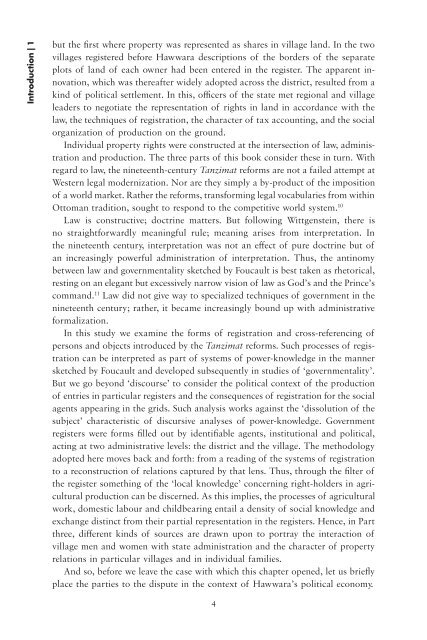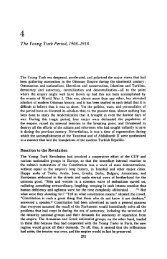Governing property, making the modern state - PSI424
Governing property, making the modern state - PSI424
Governing property, making the modern state - PSI424
You also want an ePaper? Increase the reach of your titles
YUMPU automatically turns print PDFs into web optimized ePapers that Google loves.
Introduction | 1<br />
but <strong>the</strong> first where <strong>property</strong> was represented as shares in village land. In <strong>the</strong> two<br />
villages registered before Hawwara descriptions of <strong>the</strong> borders of <strong>the</strong> separate<br />
plots of land of each owner had been entered in <strong>the</strong> register. The apparent innovation,<br />
which was <strong>the</strong>reafter widely adopted across <strong>the</strong> district, resulted from a<br />
kind of political settlement. In this, officers of <strong>the</strong> <strong>state</strong> met regional and village<br />
leaders to negotiate <strong>the</strong> representation of rights in land in accordance with <strong>the</strong><br />
law, <strong>the</strong> techniques of registration, <strong>the</strong> character of tax accounting, and <strong>the</strong> social<br />
organization of production on <strong>the</strong> ground.<br />
Individual <strong>property</strong> rights were constructed at <strong>the</strong> intersection of law, administration<br />
and production. The three parts of this book consider <strong>the</strong>se in turn. With<br />
regard to law, <strong>the</strong> nineteenth-century Tanzimat reforms are not a failed attempt at<br />
Western legal <strong>modern</strong>ization. Nor are <strong>the</strong>y simply a by-product of <strong>the</strong> imposition<br />
of a world market. Ra<strong>the</strong>r <strong>the</strong> reforms, transforming legal vocabularies from within<br />
Ottoman tradition, sought to respond to <strong>the</strong> competitive world system. 10<br />
Law is constructive; doctrine matters. But following Wittgenstein, <strong>the</strong>re is<br />
no straightforwardly meaningful rule; meaning arises from interpretation. In<br />
<strong>the</strong> nineteenth century, interpretation was not an effect of pure doctrine but of<br />
an increasingly powerful administration of interpretation. Thus, <strong>the</strong> antinomy<br />
between law and governmentality sketched by Foucault is best taken as rhetorical,<br />
resting on an elegant but excessively narrow vision of law as God’s and <strong>the</strong> Prince’s<br />
command. 11 Law did not give way to specialized techniques of government in <strong>the</strong><br />
nineteenth century; ra<strong>the</strong>r, it became increasingly bound up with administrative<br />
formalization.<br />
In this study we examine <strong>the</strong> forms of registration and cross-referencing of<br />
persons and objects introduced by <strong>the</strong> Tanzimat reforms. Such processes of registration<br />
can be interpreted as part of systems of power-knowledge in <strong>the</strong> manner<br />
sketched by Foucault and developed subsequently in studies of ‘governmentality’.<br />
But we go beyond ‘discourse’ to consider <strong>the</strong> political context of <strong>the</strong> production<br />
of entries in particular registers and <strong>the</strong> consequences of registration for <strong>the</strong> social<br />
agents appearing in <strong>the</strong> grids. Such analysis works against <strong>the</strong> ‘dissolution of <strong>the</strong><br />
subject’ characteristic of discursive analyses of power-knowledge. Government<br />
registers were forms filled out by identifiable agents, institutional and political,<br />
acting at two administrative levels: <strong>the</strong> district and <strong>the</strong> village. The methodology<br />
adopted here moves back and forth: from a reading of <strong>the</strong> systems of registration<br />
to a reconstruction of relations captured by that lens. Thus, through <strong>the</strong> filter of<br />
<strong>the</strong> register something of <strong>the</strong> ‘local knowledge’ concerning right-holders in agricultural<br />
production can be discerned. As this implies, <strong>the</strong> processes of agricultural<br />
work, domestic labour and childbearing entail a density of social knowledge and<br />
exchange distinct from <strong>the</strong>ir partial representation in <strong>the</strong> registers. Hence, in Part<br />
three, different kinds of sources are drawn upon to portray <strong>the</strong> interaction of<br />
village men and women with <strong>state</strong> administration and <strong>the</strong> character of <strong>property</strong><br />
relations in particular villages and in individual families.<br />
And so, before we leave <strong>the</strong> case with which this chapter opened, let us briefly<br />
place <strong>the</strong> parties to <strong>the</strong> dispute in <strong>the</strong> context of Hawwara’s political economy.<br />
4












